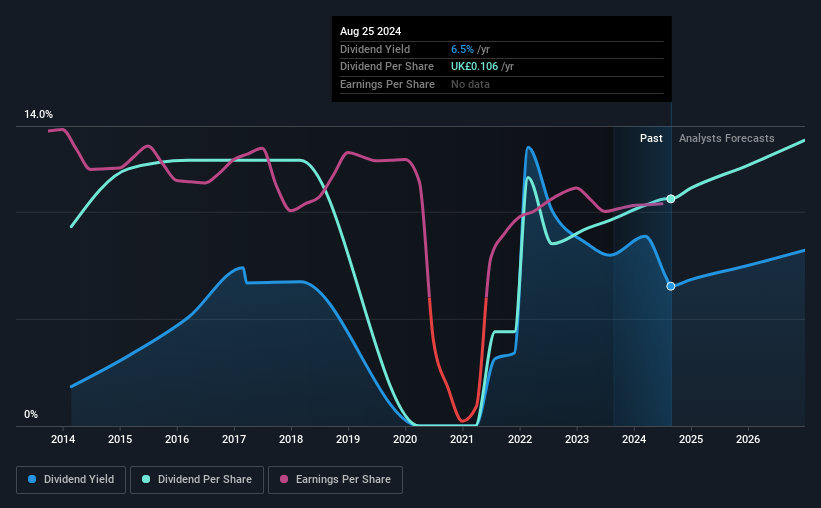- United Kingdom
- /
- Consumer Finance
- /
- LSE:IPF
Three Days Left To Buy International Personal Finance plc (LON:IPF) Before The Ex-Dividend Date

Readers hoping to buy International Personal Finance plc (LON:IPF) for its dividend will need to make their move shortly, as the stock is about to trade ex-dividend. The ex-dividend date is one business day before the record date, which is the cut-off date for shareholders to be present on the company's books to be eligible for a dividend payment. It is important to be aware of the ex-dividend date because any trade on the stock needs to have been settled on or before the record date. This means that investors who purchase International Personal Finance's shares on or after the 29th of August will not receive the dividend, which will be paid on the 27th of September.
The company's next dividend payment will be UK£0.034 per share, on the back of last year when the company paid a total of UK£0.11 to shareholders. Based on the last year's worth of payments, International Personal Finance stock has a trailing yield of around 6.5% on the current share price of UK£1.625. We love seeing companies pay a dividend, but it's also important to be sure that laying the golden eggs isn't going to kill our golden goose! That's why we should always check whether the dividend payments appear sustainable, and if the company is growing.
See our latest analysis for International Personal Finance
Dividends are typically paid from company earnings. If a company pays more in dividends than it earned in profit, then the dividend could be unsustainable. International Personal Finance paid out a comfortable 49% of its profit last year.
Companies that pay out less in dividends than they earn in profits generally have more sustainable dividends. The lower the payout ratio, the more wiggle room the business has before it could be forced to cut the dividend.
Click here to see the company's payout ratio, plus analyst estimates of its future dividends.

Have Earnings And Dividends Been Growing?
Businesses with shrinking earnings are tricky from a dividend perspective. If business enters a downturn and the dividend is cut, the company could see its value fall precipitously. Readers will understand then, why we're concerned to see International Personal Finance's earnings per share have dropped 8.4% a year over the past five years. When earnings per share fall, the maximum amount of dividends that can be paid also falls.
Many investors will assess a company's dividend performance by evaluating how much the dividend payments have changed over time. International Personal Finance has delivered 1.3% dividend growth per year on average over the past 10 years.
The Bottom Line
Is International Personal Finance an attractive dividend stock, or better left on the shelf? Earnings per share have shrunk noticeably in recent years, although we like that the company has a low payout ratio. This could suggest a cut to the dividend may not be a major risk in the near future. At best we would put it on a watch-list to see if business conditions improve, as it doesn't look like a clear opportunity right now.
With that being said, if dividends aren't your biggest concern with International Personal Finance, you should know about the other risks facing this business. For instance, we've identified 2 warning signs for International Personal Finance (1 is a bit unpleasant) you should be aware of.
A common investing mistake is buying the first interesting stock you see. Here you can find a full list of high-yield dividend stocks.
New: AI Stock Screener & Alerts
Our new AI Stock Screener scans the market every day to uncover opportunities.
• Dividend Powerhouses (3%+ Yield)
• Undervalued Small Caps with Insider Buying
• High growth Tech and AI Companies
Or build your own from over 50 metrics.
Have feedback on this article? Concerned about the content? Get in touch with us directly. Alternatively, email editorial-team (at) simplywallst.com.
This article by Simply Wall St is general in nature. We provide commentary based on historical data and analyst forecasts only using an unbiased methodology and our articles are not intended to be financial advice. It does not constitute a recommendation to buy or sell any stock, and does not take account of your objectives, or your financial situation. We aim to bring you long-term focused analysis driven by fundamental data. Note that our analysis may not factor in the latest price-sensitive company announcements or qualitative material. Simply Wall St has no position in any stocks mentioned.
About LSE:IPF
International Personal Finance
Provides consumer credit in Europe and Mexico.
Very undervalued established dividend payer.
Market Insights
Community Narratives




